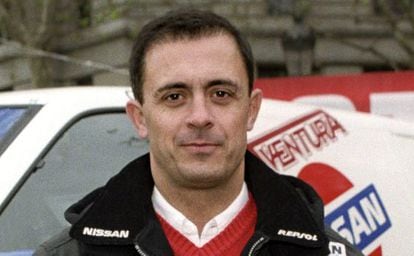Ex-Catalan premier Jordi Pujol and entire family facing trial over suspect fortune
A court says there is enough evidence to try the one-time regional chief, his wife and their seven children for taking bribes in exchange for government contracts and other favors
/cloudfront-eu-central-1.images.arcpublishing.com/prisa/JWU32L77JZHJVO6X4FU6YMLFHY.JPG)
A seven-and-a-half-year investigation into the origins of a fortune amassed by former Catalan premier Jordi Pujol has ended, bringing him, his wife and their seven children closer to standing trial for money laundering and other crimes.
Judge José de la Mata of Spain’s High Court (Audiencia Nacional) on Thursday recommended trying all nine members of the once-prominent family for cashing in on their “position of privilege” in Catalonia’s political, economic and social life and accumulating “disproportionate” wealth, allegedly through illegal commissions that companies paid to secure government contracts and other favors.
Some of these activities went on during the more than two decades that Pujol was in power, between 1980 and 2003, said the judge. The long-running investigation also targeted hidden bank accounts kept in tax havens and used to move millions of euros.
The former Catalan leader admitted publicly in 2014 that he had offshore bank accounts with several million euros in Andorra
De la Mata said that there are enough grounds to pursue the allegation that the family functioned like a criminal organization, engaging in money laundering, tax crimes and false documentation.
Besides Pujol, who is now 90, his wife Marta Ferrusola, and their seven children – Jordi, Josep, Pere, Oleguer, Oriol, Marta and Mireia – another 18 individuals have been targeted by the court for allegedly participating in these illegal activities, including Mercé Gironés, the ex-wife of the eldest son Jordi, and three prominent entrepreneurs, Luis Delso Heras, Carlos Sumarroca Coixet and Carlos Sumarroca Claverol.
In a 509-page document, the judge notes that the family was unable to provide proof of the origin of their fortune, and that there is strong evidence suggesting that it did not come from an inheritance received from the grandfather, Florenci. Pujol and Ferrusola were called to testify in court about this matter in February 2016.
The High Court has assumed jurisdiction in a case that was originally opened by a Barcelona judge against the elder Pujol after the former Catalan leader admitted publicly in 2014 that he had offshore bank accounts with several million euros in Andorra, a microstate nestled between Spain and France that has long been considered a tax haven.
In his letter, Pujol claimed that the fortune belonged to his father, Florenci, who had made the money on the currency black market during the Franco dictatorship and left it to his grandchildren.

“No element whatsoever has been contributed that might help confirm the truthfulness of this version, nor has any reasonable explanation been provided by any of the members of this family,” noted De la Mata, adding that the Pujols failed to say which bank the alleged inheritance was deposited in.
The former Catalan premier admitted to the existence of the hidden account following a disclosure by an anonymous informant in Andorra. The revelation triggered a political storm in Catalonia at a time when the independence movement was picking up steam ahead of a non-binding popular vote in November 2014 (predating the October 1, 2017 referendum and unilateral independence declaration).
Illegal commissions
The judge suspects that part of the money comes from illegal commissions paid by companies during the years that Pujol, considered one of the founding fathers of modern Catalonia, was in power. The party he headed for decades, Democratic Convergence of Catalonia, was in 2018 found to have taken millions of euros in illicit donations (see box below).
De la Mata’s investigation noted that the illicit payments to the Pujols were concealed through complex corporate structures, using tax havens and contracts for alleged services or advisory work whose existence is not backed up by any documentary evidence. In exchange for these fees, the Pujols used their influence to help these companies win government contracts and concessions, and to get land rezoned.
De la Mata found that these “corrupt activities” were organized into a family structure helmed by Pujol and his wife – who liked to call herself “the Mother Superior of the congregation” – with their eldest son Jordi acting as the manager in charge of strategy and of distributing the money among the family members. The other brothers and sisters followed his instructions. Jordi Jr was himself the target of a separate investigation for money laundering. Another son, Oriol, was the target of an investigation into illegal contract awards.
This has led the judge to consider that there are elements of criminal organization in the family’s activities: different levels of hierarchy, a planned structure, and duration in time, all of it aimed at gaining illicit wealth. The family’s first bank accounts in Andorra date back to 1992, while their last foundations were shut down in 2014.
Party funding
The CDC dominated Catalan politics for decades in an alliance with Democratic Union of Catalonia (UDC) that was known as CiU. The party was involved in a number of corruption scandals including the Palau case, which found that CDC received millions from corporate donations channeled through a concert hall. In 2016, the party was rebranded as the Catalan European Democratic Party (PdeCAT), one of whose most prominent members has been former premier Carles Puigdemont, who spearheaded the 2017 unilateral independence bid.
English version by Susana Urra.
/cloudfront-eu-central-1.images.arcpublishing.com/prisa/KXZXTPZ4Q5FTJE4QUXH5OZJOLA.jpg)











































